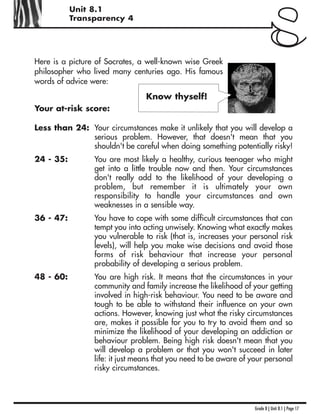
8.1 trans 4
- 1. Grade 8 | Unit 8.1 | Page 17 Unit 8.1 Transparency 4 Here is a picture of Socrates, a well-known wise Greek philosopher who lived many centuries ago. His famous words of advice were: Your at-risk score: Less than 24: Your circumstances make it unlikely that you will develop a serious problem. However, that doesn't mean that you shouldn't be careful when doing something potentially risky! 24 - 35: You are most likely a healthy, curious teenager who might get into a little trouble now and then. Your circumstances don't really add to the likelihood of your developing a problem, but remember it is ultimately your own responsibility to handle your circumstances and own weaknesses in a sensible way. 36 - 47: You have to cope with some difficult circumstances that can tempt you into acting unwisely. Knowing what exactly makes you vulnerable to risk (that is, increases your personal risk levels), will help you make wise decisions and avoid those forms of risk behaviour that increase your personal probability of developing a serious problem. 48 - 60: You are high risk. It means that the circumstances in your community and family increase the likelihood of your getting involved in high-risk behaviour. You need to be aware and tough to be able to withstand their influence on your own actions. However, knowing just what the risky circumstances are, makes it possible for you to try to avoid them and so minimize the likelihood of your developing an addiction or behaviour problem. Being high risk doesn't mean that you will develop a problem or that you won't succeed in later life: it just means that you need to be aware of your personal risky circumstances. Know thyself!